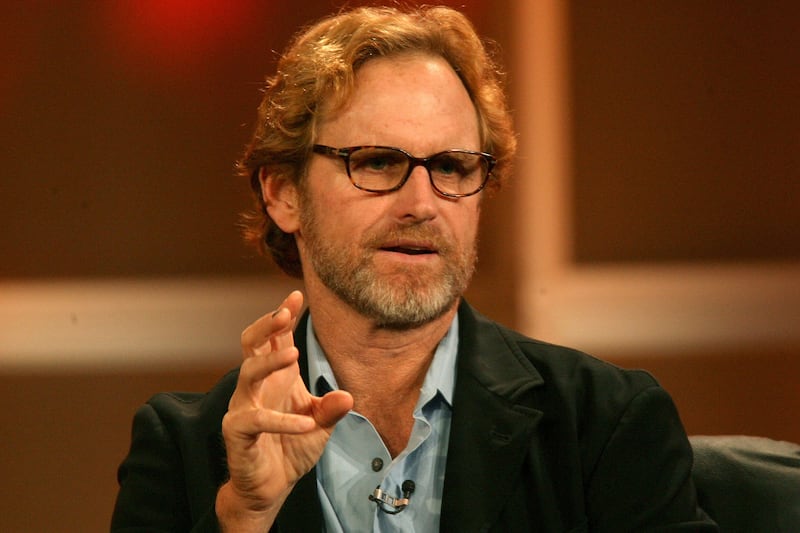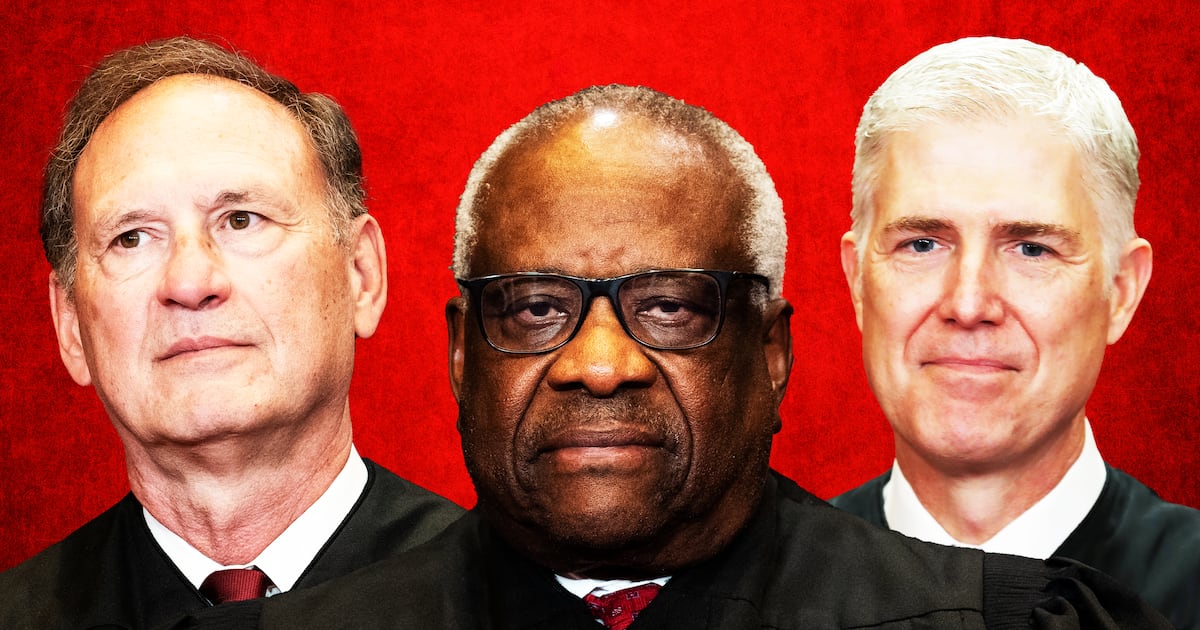Jere Burns’s wife couldn’t take it anymore.
Last Monday, she confronted him after watching her husband’s second episode of Bates Motel, where he is currently playing Jake Abernathy, a sinister motel guest who has done the impossible: terrified the woman who gave birth to Norman Bates. “My wife walked into the kitchen, where I was getting something to eat,” said Burns, “and she said, ‘Honey, you’re really scary. Would you stop it, please?’ I said, ‘Well, my job is done!’”

Far from it. Burns’s menacing, creepy guest-starring turn on A&E’s modern-day Psycho prequel—he continues threatening Norma Bates (Vera Farmiga) in tonight’s episode and in next week’s season finale—is just the latest addition to his formidable Axis of TV Evil. With Wynn Duffy (FX’s Justified), Anson Fullerton (USA’s Burn Notice), and now Abernathy, the 58-year-old actor has enjoyed an unexpected career resurgence playing TV’s smartest and most intimidating villains.
ADVERTISEMENT
“He has this great quality of being very personable and real,” Bates Motel executive producer Kerry Ehrin told The Daily Beast, “and when you have created a character that could go down the road of being very arch, that’s a very nice element to bring into it. He kind of wants you to like him, even though he’s holding a gun to your head.”
Burns is relishing his run of TV badassery. “The reality is that if you’re not a series regular, then the majority of these parts are bad guys,” he said. “Maybe I have a dark side ... or maybe it’s just really fun. I’d rather play that guy than the dad, especially when you get the opportunity to play a guy with layers, where you get to bring some intelligence. There’s nothing more fun than a crazy, really smart guy.”
And thanks to cable’s shorter seasons, Burns has the freedom to juggle multiple roles, like this past year where he shuttled between the Justified and Bates sets. (He previously did double duty on Justified and Burn Notice.) “It’s a really fun world to be working in these days,” he said. “I remember when I started, television was sort of the poor stepchild to film, and now everybody wants to get on a great series. Everybody.”
That includes Farmiga, who has been collecting raves all season for her work as Hollywood’s most infamous mother. “Vera is a gift, so working with Vera is amazing,” Burns said. “She’s willing to go anywhere and do anything.” Added Ehrin: “There’s something about the chemistry between him and Vera that’s just so golden, something so real about both of them.”
In Bates’s final two episodes, the tension between Abernathy and Norma “definitely amps up and comes to a head,” said Ehrin. “It has a lot to do with the nature of this town and the nature of the people, and who [Sheriff] Romero [played by Nestor Carbonell] is. A lot of things will fall into place in a surprising way.” Viewers will also learn exactly what brought Abernathy to town and whether he was involved with depositing Deputy Shelby’s unearthed corpse in Norma’s bed at the end of last week’s episode. (“One would guess, yes!” said Ehrin.)
“Everybody says, ‘Oh, he’s scary, he’s creepy.’ All I want is what’s due to me!” Burns said of Abernathy’s soon-to-be-revealed motivation. “I’m a little under the gun here, because I trusted people to do stuff for me, and they failed. And it’s making me look bad. So I’m more than a little annoyed by the circumstances that bring me to town.”
That’s a trait shared by Justified’s Wynn Duffy, a mainstay of the show’s Dixie Mafia, who escaped the chopping block not once but twice in the FX drama’s early seasons. At first, said Burns, Wynn was supposed to be shot and killed at the end of his original two-episode stint in Season 1. “And by the second episode, they figured out a way to not kill him, as they sometimes do on Justified if they like a character,” said Burns. “They shot me in the shoulder instead.”
One season later, Wynn’s number came up again. “It was this showdown between Raylan [Timothy Olyphant] and I, a fantastic scene. The problem was that I died at the end of it,” Burns said. “And I think Tim was not happy with that scene that day, and as often happens on Justified, stuff gets rewritten on the fly. It’s a very collaborative show, in a good way. So that day, he didn’t die again.”
The show’s frequent last-minute rewrites also lead to Wynn’s most memorable moment: the scene early in the Season 3 finale (“Slaughterhouse”) in which the usually unflappable Duffy completely loses his shit as an exasperated Raylan plays Russian roulette with him to pry loose some needed information. “I got a call the night before we were to shoot a different scene, saying, ‘Can you come in three hours early? Tim wants to talk about that scene between you and him,’” said Burns. “Tim had found a passage in one of Elmore [Leonard]’s books that had a Russian roulette scene in it, and Tim pitched to me, ‘Instead of doing what’s here, why don’t we come up with something?’ So he and I created—mostly him, but we did it together—this scene. We sketched it out on paper and showed it to Dean Parisot, who was directing that episode, and one of the writers, and they said, ‘Great! Let’s shoot that!’ It played like gangbusters.”
As Justified’s fourth season concluded last month, Wynn revealed that the Detroit mob had put him in charge of its heroin business, and enlisted Boyd Crowder (Walton Goggins) to run things for him in Kentucky. Does this mean that Wynn could finally become Justified’s Big Bad next season?
“It seems that way, but you never know on Justified,” said Burns. “It’s a cast of thousands and you never know how things are going to shake out. I might have had a bigger part last year, but then I got pneumonia, and then they were allowing me to go back and forth to Canada to shoot Bates, so I’m not really sure. But maybe next year will be Duffy’s year.”
Burns owes his recent string of meaty roles to one career-reviving moment: in the Season 3 premiere of Breaking Bad (“No Más”), he played the leader of the Narcotics Anonymous group attended by Jesse Pinkman (Aaron Paul). During one session around a campfire, Burns delivers an extended, emotionally wrenching monologue about being responsible for his daughter’s death. “I was so in love with that speech, and it was so well-written that it was really easy to internalize. I have some experience in that area, I know that world, and it came really easily,” Burns said. “Sometimes you have a perfectly crafted piece of writing that if an actor connects to, you don’t really need to do much.”
That scene helped put Burns back on the map for viewers, many of whom hadn’t seen him in a role that indelible since he played smarmy ladies’ man Kirk Morris on Dear John, the 1988–92 NBC sitcom starring Judd Hirsch. The lothario in a self-help group, Kirk (a forerunner of How I Met Your Mother’s Barney Stinson) helped make Burns a television star, though the Cambridge, Massachusetts, native admits now that he didn’t appreciate his good fortune at the time: “You have no idea how good you have it when you’re that young and you get to have that kind of success so suddenly. You just accept it and think, ‘This is what it’s going to be like, except it’s just going to get better and better all the time.’ And that’s not necessarily the case.”
Instead, after Dear John ended, Burns found himself struggling to break free from the Kirk persona. “I had a few deals after that at networks, and people were always trying to re-create a version of that character, which was impossible,” he said. “So I would get shoehorned into a show like The Mommies” or other short-lived sitcoms like Something So Right and Good Morning, Miami. “Then you could get a TV movie during hiatus and play either the dad of the woman in peril or the assailant of the woman in peril. Those were the years of half-hour comedies and cheesy, made-for-TV movies, and that’s how I made my living for a decade.”
When that steady work began to dry up, Burns refused to get discouraged. “I always had stuff in my life that I enjoyed doing when I wasn’t working,” he said. “So it was never like, ‘What do I do with myself?’ I would just surf, or ski, or climb. I like my downtime. I still do. I don’t want to be working all the time!”
That said, he would love the chance to return to his sitcom roots. “Now, 20 years later, I realize how fun a well-written half-hour comedy is, and I’m so anxious to do another one,” said Burns. “I love comedy, I love telling jokes, I love the rhythms .. I really do miss it. I don’t begrudge any of the stuff I’m on—I love it to death—but a half-hour comedy is a really fun life.”






